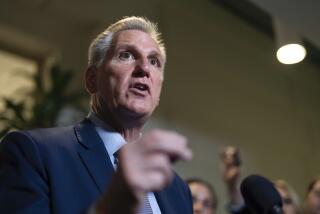Behind the GOP rebellion
- Share via
WASHINGTON — On two consecutive mornings this week, top Bush administration officials went to Capitol Hill to sell House Republicans on the $700-billion Wall Street bailout. Each time, they failed to close the deal.
So with fewer than 50 of the 199 party members ready to back the administration plan, House Minority Leader John A. Boehner (R-Ohio) on Wednesday deputized nine House Republicans -- a cross-section of conservatives and moderates -- to come up with another way to rescue the U.S. economy that the rebels would support.
The idea behind the plan they came up with had already been studied and rejected by Treasury Secretary Henry M. Paulson.
The Republican initiative threw a monkey wrench into negotiations just as House and Senate Democrats were closing in on a breakthrough deal with the administration. But as members of the group and other Republicans explained it, their actions served at least one purpose: They forced the administration and Democratic leaders to consider alternatives and include the House Republicans in the process.
“Now we’re a part of the game,” said Rep. Ray LaHood (R-Ill.). But how they got into the game has angered Democratic leaders.
On Thursday afternoon, members of Boehner’s working group issued a one-page proposal of “Economic Rescue Principles” that called for a dramatic shift in the way Washington would stabilize Wall Street. Instead of the government purchasing as much as $700 billion in debt-laden mortgage-backed securities to get credit flowing again, the plan called for the government to insure those securities, with Wall Street paying the tab instead of taxpayers.
Although House Speaker Nancy Pelosi (D-San Francisco) and others negotiating a deal don’t oppose the insurance idea as a component of a bailout, they object to that strategy as the centerpiece.
“No one is saying that we shouldn’t have insurance, but not as a substitute for the Paulson plan,” said Rep. Barney Frank (D-Mass.), chairman of the House Financial Services Committee. “Then there’s no deal.”
Frank chastised Republicans for waiting five days after the administration released its plan to make their proposal, and for not raising the issue during a hearing of his committee attended by Paulson.
“None of them asked Paulson about it, because I think they knew he would pooh-pooh it,” Frank said.
But Rep. Paul D. Ryan (R-Wis.), a member of the working group Boehner established, said House Republicans didn’t know there was a lack of support until after the Bush administration briefings Tuesday and Wednesday mornings. The briefings raised more questions than they answered.
“We basically said we’ve got to come up with a Plan B,” Ryan said.
Boehner tapped Rep. Eric Cantor (R-Va.), the chief deputy whip, to lead an effort to find an alternative that more Republicans -- and Democrats -- could support.
“We all kind of fanned out and got ideas from various experts in the market,” Ryan said. The goal wasn’t to booby-trap the ongoing negotiations, he said. “It was a sincere attempt to break the logjam and bring a solution to the table . . . in the belief that Paulson was going down.”
As an alternative, the group proposed selling banks government insurance for mortgage-backed securities. The idea, as Ryan said in unveiling the proposal Thursday, is that “Wall Street bails itself out.”
Cantor acknowledged that some mortgage-backed securities were too complex to insure and would have to be purchased by the government.
The House Republican group said it reached out to Democrats and found some were receptive to its proposal. Rep. Brad Sherman (D-Sherman Oaks) has not endorsed it, but he was happy it had stalled the Bush administration plan.
“I’m glad that the juggernaut got slowed down, and it got slowed down by Republicans,” said Sherman, who organized a meeting Friday of 22 House members skeptical of the administration’s bailout plan.
Republicans said they were prepared to negotiate the insurance provision and others included in their proposal, such as cutting the capital-gains tax rate to inject more money into the financial system.
“I hope Mr. Paulson learns a lesson: that we have a duty to inform ourselves and to act prudent and to answer questions,” said Rep. John Shadegg (R-Ariz.). “I am now pleased that instead of this being a one-way discussion with the administration telling us what had to happen, it is now in fact a two-way dialogue.”
--
nicole.gaouette@latimes.com
More to Read
Get the L.A. Times Politics newsletter
Deeply reported insights into legislation, politics and policy from Sacramento, Washington and beyond. In your inbox twice per week.
You may occasionally receive promotional content from the Los Angeles Times.










